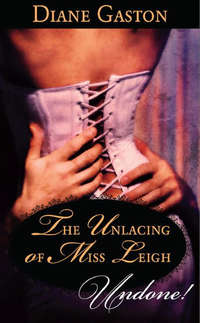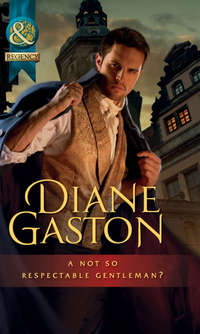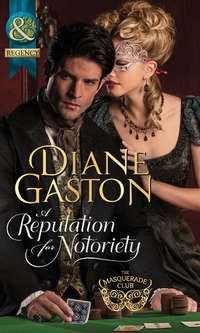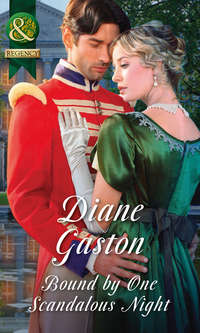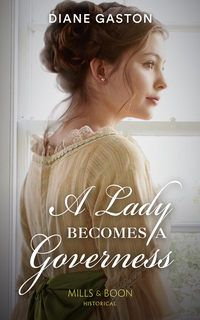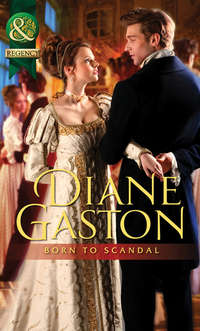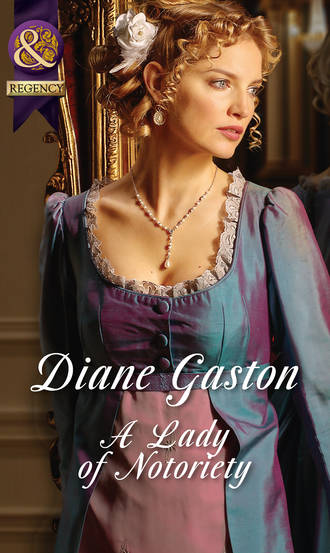
Полная версия
A Lady of Notoriety
Cursed eyes!
Was it day or night? Was he alone or was someone in the room?
Was she here?
He remained still and strained to hear the sounds of someone moving, someone breathing.
It was so quiet.
The hiss of the fireplace; otherwise, silence. Was anyone near? Would they hear him if he called out for help?
Although he’d be damned if he’d call out for help.
Or for water.
His throat was parched with thirst. There must be water somewhere in the room. She must have left some for him.
He climbed out of bed, not as steady on his feet as he might wish. The carpet on the floor was soft and cool on his bare feet. Carefully, he started from right next to the bed, groping—and finding—a side table. He ran his hand over the table’s surface. No water. Merely a candlestick—certainly an item for which he had no need.
He groped past the table and bumped into a wooden chair. He backed away and knocked the table onto the floor. The carpet muffled the sound. No one would be roused by the noise.
Crouching, he felt around for the table, found it and righted it. The candlestick must have rolled away. Useless to search for it anyway.
Moving cautiously again, he made his way past the chair. With the wall as his guide, he inched his way towards the fireplace, feeling the fire’s heat grow stronger as he neared. His hand found the mantel. His toes smashed against the hearth.
He backed away and found more chairs and another table upon which there was a book. Another item for which he had no use.
Continuing, he discovered a door. It was a dressing room, smelling of dust, its shelves empty. He closed the door and his fingers felt along the wall until he came to another door. The door to the hallway. He turned the latch and opened the door and felt the change in temperature. But the hallway was silent.
He closed the door again and groped his way back to the bed. On the other side was another table. On the table he found a drinking glass and the water pitcher. He could never pour the water into the glass. He lifted the entire pitcher to his lips and took several gulps of the cool, minty liquid.
Placing the pitcher back on the table, he felt his way back to the bed, but halted. Lying abed like an invalid held no appeal.
He might as well continue his haphazard search of the room.
He found his trunk in one corner, his boots, smelling of bootblack, next to it. He found a rocking chair and a window.
A window! Fresh air. Hugh found the sash, opened the window and felt a cool breeze against his face. On the breeze was the scent of green grass, rich soil and flowers. He stuck his hand out the window and tried to sense whether it was day or night.
Without eyes, he could not tell.
He felt for the rocking chair and turned it towards the window. She must have sat in this rocking chair while in the room; her scent, very faint, clung to it. He lowered himself into it and rocked. The rhythm soothed him. The breeze cooled his skin. And banished the memory of the fire’s infernal heat.
* * *
He must have dozed. For how long this time? Half awake, half asleep, he became aware of a knock at the door. The door opened. He knew instantly it was not she.
‘Sir! You are not abed.’ A male voice.
Hugh shook himself awake. ‘Who are you?’
‘I am Carter, sir. La—Mrs Asher’s footman.’ The voice did not come closer, so Carter must have remained by the door. ‘I came to attend you.’
‘I am grateful.’ She’d said her footman would come. ‘Can you tell me what time it is?’
‘Seven, sir,’ Carter replied.
‘Morning or evening?’ Did they not see he could not tell?
‘Morning, sir.’
‘What day?’ Hugh tried not to let his impatience show.
‘Oh! You must not realise—’ Carter’s voice deepened. ‘Forgive me—I will explain—it is Friday. We arrived here Wednesday. The day after the fire. You slept most of yesterday. It is Friday morning now.’
He’d lost two days.
‘I will assist you, sir. Shave you and whatever else you might require.’
Shave? Hugh scraped his hand against the stubble on his chin. He must have appeared like a ruffian to her.
Carter’s voice came closer. ‘Unless you would like me to help you back into bed.’
‘No.’ Hugh forced himself not to snap at the man. It was not Carter’s fault he needed the assistance. ‘I will not return to bed. Shave me and help me dress, if you would be so good.’
Gentlemen of Hugh’s rank customarily employed a valet, but Hugh never did. He had no qualms about borrowing the services of someone else’s valet when absolutely necessary, but what he could do for himself, he preferred doing. It made him free to come and go as he wished without having to consider anyone else’s needs.
Now, though, he was not free. He was as dependent as a suckling babe.
He submitted to Carter’s ministrations with as good grace as he could muster, even though Carter needed to help him with his most basic of needs. He’d do them all without help as soon as he could, he promised himself. After he was shaved, bathed, toileted and dressed, he found his way back to the rocking chair, more fatigued than he would ever admit.
‘Thank you, Carter,’ he said. ‘What of breakfast?’ His hunger had returned. ‘Will you help me to the breakfast room?’
He sensed Carter backing away. ‘I—I believe Mrs Asher preferred you eat here, sir. Your health is fragile, I’m given to understand.’
Hugh refused to be fragile. ‘Very well, but tell Mrs Asher I wish to speak with her as soon as it is convenient.’
‘Very good, sir.’ Carter moved towards the door.
‘In fact—’ Hugh raised his voice ‘—tell Mrs Asher that I would like to see the village doctor. I am well able to pay for his services, so let there be no worry over that. I wish to see him today.’ And find out, if possible, if he was to be blind or not.
‘As you wish, sir.’ He imagined Carter bowing. ‘Breakfast as well, sir.’
The door closed and the footman’s steps receded.
Hugh rose again. It felt better to be dressed, even if he was merely in shirt, trousers and stockings. At least when Mrs Asher returned, he would look more like a gentleman and less like an invalid.
If one could ignore the bandages covering his eyes.
He made his way around the bed. If his memory served him, the table on the other side of the bed, the table he’d knocked down during the night, was where he had eaten the porridge. He found the table again, bumped into the wooden chair again and kicked the lost candlestick with his toe, sending it skittering away.
Nonetheless, he managed to arrange the table and chair for eating. It was a minor matter, but a victory all the same. He was not entirely helpless.
Even so, a lifetime like this would be unbearable.
* * *
Daphne had left the two prospective maids in the company of Mrs Pitt after finally sorting out the matter. She’d thought she could simply hand them off to the housekeeper and be done with it, but the woman was shockingly dependent upon Daphne to make even the smallest of decisions, like what their duties should be, whether they should live in the house—yes, they should. Why have maids if they were not around when you needed them? Mrs Pitt also would have offered the girls a pittance for what would be very hard work, tending to the fires, cleaning the house and otherwise seeing to her needs. It was also very clear that they needed new clothes.
And that they were hungry. They both kept eyeing the bread Mrs Pitt had taken from the oven, and neither could pay attention to the discussion. So Daphne told Mrs Pitt to feed them, which led to a long discussion of what to feed them and what to feed Mr Westleigh and how was she—Mrs Pitt—to cook all that food, now that there were two more mouths to feed and two more workers to supervise.
By the time they’d finished, Daphne had given Mrs Pitt permission to hire a cook, a kitchen maid, another footman and two stable boys to help John Coachman. Mr Pitt was sent into the village to speak with some people he and Mrs Pitt thought would be perfect for the jobs, and Monette was getting her cloak and bonnet so she could accompany the girls to the local draper for fabric to make new dresses and aprons.
What fuss. Her husband would have been appalled at her being so bothered by such trivial matters. Even at the convent at Fahr, someone else saw to the food, the clothing, the cleaning.
As tedious as it all was, Daphne walked through the hall with a sense of pride. Her decisions were good ones after all. And she could well afford to pay all the servants even if she stayed here a year instead of two weeks.
As she crossed the hall, Carter descended the stairs.
She smiled up at him. ‘How is Mr Westleigh this morning, Carter?’
He reached the final step. ‘Much improved, ma’am. He wishes to speak with you.’
Oh, dear. And she wanted to avoid him.
‘What about, do you know?’ Perhaps he’d changed his mind about contacting his family.
Carter frowned. ‘He wants to see a local doctor. I believe he is most unhappy about being bandaged and confined. He wants to see a doctor immediately.’
It was a reasonable request. He’d been nearly insensible when the surgeon at Ramsgate examined him. If only she’d known a few minutes earlier, she could have asked Mr Pitt to fetch the doctor.
‘Could you go to the village and locate the doctor? Or find Mr Pitt and give him the errand? He left for the village a few minutes ago.’
Carter’s brows knit. ‘Shall I take Mr Westleigh his breakfast first, ma’am? I told him it was coming.’
The poor man must be famished. He’d only eaten a bowl of porridge since they’d arrived here.
She sighed. ‘No. I will take him his breakfast. Perhaps there was something else he wanted to say to me.’
Carter came with her to the kitchen where Mrs Pitt gave him the doctor’s direction and fixed the tray for Mr Westleigh.
Daphne carried the tray up the stairs and knocked upon Westleigh’s bedchamber door.
‘Come in, Carter.’ His voice sounded stronger than the day before.
She opened the door and entered the room, kicking the door closed behind her.
He was seated at the table and chair where he’d eaten the porridge, and was dressed in a clean white shirt and dark brown trousers that showed off his broad shoulders and lean hips. She swallowed, suddenly remembering his strong arms carrying her in the inn.
‘I can smell the bread from here.’ He gestured with his hand. ‘I will eat at the table.’
She crossed the room. ‘It is Mrs Asher, not Carter.’
He tensed, as if he’d not liked mistaking her identity, and stood as a gentleman does when a lady enters the room. ‘Good morning,’ he said stiffly.
‘Please sit,’ she responded. ‘Carter said you wished to see me, so it is I who brings you breakfast.’
He lowered himself back in the chair. ‘I appreciate you coming so quickly.’
She placed the tray of food in front of him. ‘I sent Carter to fetch a doctor and we did not wish you to wait. Are you hungry?’
‘Ravenous.’ He carefully ran his hands over the food.
She’d instructed Mrs Pitts to serve foods he could eat with his hands and spare him the struggle of manoeuvring utensils. They’d settled on warm bread sliced open with melting butter inside, two cooked eggs, cubes of cheese and a pot of tea.
He hesitated.
It made her uncertain. ‘I will pour your tea,’ she said. ‘I remember how you take it, but do, please, eat. You must be very hungry.’
‘I hope my manners will not offend.’
Oh, he was merely being polite. ‘Have no fear. I am not easily offended.’
How odd of her to say such a thing. At a formal dinner party, she once would have had much to say about poor manners, and she’d often shaken her head at the way some of the lower classes consumed their food. Perhaps she was developing some tolerance, like the abbess had often encouraged her to do.
‘I am surprised to see you dressed,’ she went on in a conversational tone. ‘I thought you would still be in bed.’
‘No more bed.’ His voice was firm. ‘I am well enough to be up.’
She pursed her lips. ‘Are you certain? The surgeon in Ramsgate said you would need time to recuperate. I think he meant you should remain in bed.’
‘I think him wrong,’ he said stiffly. ‘I feel recuperated. Perhaps the village doctor will say I may have my bandages removed and be on my way.’ He paused. ‘I told Carter I am well able to pay whatever the expense. I intend to compensate you, as well.’
‘Money does not concern me. I certainly need no compensation.’ She waved a dismissive hand. ‘I—I do not know if Carter can produce a doctor this very day, though.’
The village did have a surgeon, Mrs Pitts had said, but he was kept very busy.
Westleigh took a bite of bread, chewed and swallowed it. She could not help but notice the muscles in his neck move with the effort. She touched her own neck.
‘Let us hope he can come today,’ he said.
He must be as eager to be on his way as she was for him to leave, but should she trust his care to a village doctor? Perhaps she should send for a London physician. She would love to send for the physician her husband had used when he was in town, but that man knew her.
Of course she could simply tell Westleigh now who she was.
She opened her mouth.
But he spoke first. ‘Might I have a clock?’ he asked. ‘A way to keep track of time. I cannot even tell if it is day or night.’
How awful! All sorts of things must be difficult if one was not able to see. How much worse if one would never see again.
She vowed she would leave a large coin in the cup of the next blind beggar she came upon.
‘I am so sorry,’ she cried. ‘I should have thought to provide you a clock. Perhaps I can purchase a watch that chimes. I have seen such watches. You could keep it next to you.’
Although, now that she thought of it, would a small village have such a watch? She’d only seen them in London shops.
‘A clock will be sufficient,’ he responded. ‘And I am well able to pay for it, if there is not a spare one in the house.’
‘We’ll find you one, do not fear.’ There was one on the mantel in the library. She’d have it brought to him immediately.
Or she would have to bring it herself, since she’d sent everyone else away besides Mrs Pitts, who would be much too busy.
‘Wait here a moment,’ she said, which was a silly thing to say. Where could he go without sight?
She hurried out of the room and ran down the stairs to the library. Carefully she took the clock from the mantel and carried it back to his room.
‘I’ve brought you a clock!’ she said as she entered. ‘I’ll place it on the mantel and we’ll make sure Carter winds it for you.’
‘I did not mean for you to bring it so quickly, but I am very grateful.’ He had finished the food and was feeling for the tea cup.
She walked over and guided his hand to it.
He stilled and his face tilted towards hers.
She wished she could see him, see all his face. She had seen him a few times at the Masquerade Club and had been introduced to him once. It was the only time she could remember speaking to him, and she’d paid little attention.
‘Is there anything else?’ she murmured. ‘Anything else I can do for you?’
He continued to seem as if he was facing her. ‘I want to leave this room,’ he said. ‘To come and go as I wish. Surely there must be a drawing room or a library or someplace I could sit without disturbing anyone.’
‘But how can you? You can’t see,’ she cried.
He scowled. ‘I can walk.’
She feared he would injure himself even more. What would she do then?
‘The surgeon at Ramsgate said—’ She cut herself off. ‘Let us at least wait until another doctor examines you. I would hate to risk your recovery.’
He gulped down the cup of tea.
She leaned closer to pick up the tray.
‘Roses,’ he said softly.
‘I beg your pardon?’
‘You smell like roses,’ he explained.
She felt her cheeks flush. It delighted her that he’d noticed. It was her favourite scent. She always rinsed herself with rosewater and any perfume she purchased must smell like roses.
‘I—I should leave now, unless there is something else I can do—’ She bit her lip.
‘Nothing.’ His voice dipped low. ‘I am grateful for the breakfast and the clock. And for sending for the doctor.’
She cleared her throat. ‘Let us hope he comes soon.’
Balancing the tray, she exited the room and only then did she realise she’d again not told him who she really was. Maybe when the doctor came, he would indeed say Westleigh was recovered. Maybe he would remove Westleigh’s bandages and his eyes would work perfectly and she could have her coachman take him to London this very day.
* * *
It was late afternoon before the doctor called at the cottage.
Carter announced him to Daphne as she sat in the drawing room, writing a letter to her man of business, informing him of her arrival in England and her stay at Thurnfield.
She, of course, did not explain why she remained at Thurnfield.
She rose at the doctor’s entrance. ‘Mr Wynne, how good of you to come.’
He was a man of perhaps fifty years, with a rough but kindly appearance. When he saw her, his face lit with surprise, then appreciation. ‘Mrs Asher! My word. May—may I welcome you to Thurnfield. You are a very delightful addition, if I may be so bold as to say.’
‘Thank you, sir.’ Daphne’s response was well practised. Men who saw her for the first time often reacted so. In this instance, however, she did not want her beauty to distract the doctor from why he was here. ‘I do believe Mr Westleigh is anxious for you to examine him. Carter can take you up to him directly.’
He tapped his lips. ‘In a moment. I understand from Mr Carter that you witnessed the injury and the examination by the other surgeon. I think it best I should speak with you first.’
She sat again and gestured to a chair. ‘Do sit.’
He lowered himself into the chair and leaned towards her, all ears. And eyes. ‘Now. Tell me what happened.’
She relayed the information as succinctly as she could, but he asked several questions about the injury and other surgeon’s examination, forcing her to repeat herself.
It was a good thing she had not ordered tea, or the man would never make it up to Westleigh’s room.
Her patience frayed. ‘I do think you should see Mr Westleigh now, sir. He has been waiting a very long time.’
‘Indeed. Indeed.’ Mr Wynne took his time rising from his seat. ‘You will accompany me? I may need information only you will have.’
She’d just given him all the information she possessed. Several times.
But it seemed expedient to do as he requested, merely to get him to actually see Westleigh, who had waited all day for the man. She rose. ‘Come with me.’
Daphne heard the clock in Westleigh’s room chime the quarter-hour as she raised her hand to knock.
‘Please, come in.’ Westleigh sounded impatient.
‘Mr Westleigh, it is Mrs Asher,’ she said as she opened the door. ‘I have brought Mr Wynne, the surgeon, to see you.’
Hugh had been seated in the rocking chair next to the window, which was open to the afternoon breeze. He stood and extended his hand almost in the surgeon’s direction. ‘Mr Wynne. I have been eager for your arrival.’
Wynne clasped his hand. ‘Westleigh. Pleased to meet you. Mrs Asher has told me of your injuries.’
‘She has?’ His posture stiffened. ‘Perhaps you would be so kind as to tell me what she said.’
‘I told him you were in a fire,’ Daphne responded. ‘And that you were hit on the head and your eyes burned. I told him the other surgeon said you were concussed and that your eyes needed to remain bandaged for two weeks.’
‘I could have told him that,’ Westleigh remarked.
‘I agree.’ She had not wished to be this involved. Should she tell him the surgeon preferred her company to the duties that called him here?
‘A nasty business, eh?’ Wynne finally turned his attention to the patient. ‘Please do sit and I will bring a chair closer to you.’
Westleigh lowered himself back into the rocking chair and Wynne brought the wooden chair over to him. Daphne stood near to the door.
‘Now,’ Wynne said, ‘tell me—do you have any difficulty breathing?’
Westleigh took a breath. ‘No.’
Wynne nodded, but from his bag pulled out a cylindrical tube. ‘Best to check, in any event.’ He placed one end of the tube on Westleigh’s chest, the other against his own ear. ‘Breathe deeply for me.’
Westleigh did as requested and the surgeon moved the tube to various locations on his chest.
‘Your lungs are clear,’ Wynne said. ‘Have you experienced any dizziness?’
‘None now,’ Westleigh answered. ‘Not even if I walk. I am quite steady on my feet.’
‘Any pain?’ the man asked.
Westleigh shrugged. ‘My throat feels a bit rough. My head aches still, but not excessively. It is my eyes—my eyes concern me the most. They ache with a dull sort of pain. Again, not excessive. If I try to move my eyelids, however, the pain sharpens a great deal.’
‘Best you not move your eyelids.’ Wynne chuckled.
Westleigh frowned.
This was not a joking matter to him, Daphne wanted to say.
Wynne leaned forwards. ‘Let me have a look at you.’
He placed his fingers on Hugh’s head. His fingers looked stubby, but his touch seemed sure.
‘It is most remarkable you were not more burned.’ Wynne moved his fingers around his head and looked closely at the exposed parts of his face. ‘The eyes can get the worst of it even if your skin’s damage is superficial. Your hair is singed in places and I cannot see under the bandage, but I suspect you are fairly unscathed.’
Daphne had seen his eyes, though. His eyes had been alarmingly cloudy.
Wynne leaned back. ‘I would like to examine under your bandages, but you must promise me something.’
‘What is that?’ Westleigh asked.
‘Keep your eyes closed.’ Wynne emphasised each word. ‘If you do not keep your eyes closed, you risk further injury and blindness. Do you understand me?’
‘I understand.’ Westleigh answered in a low voice.
Wynne turned to Daphne. ‘Mrs Asher, may we close the window and draw the curtains?’
‘Certainly.’ She hurried to do as he asked.
Westleigh remained still as Mr Wynne unwound his bandages. He was like a taut string vibrating with tension. The bandages seemed endless, but finally Wynne came down to the two round pieces of cloth that were pressed against Westleigh’s eyelids.
‘Remember, keep your eyes closed,’ he warned.
He removed the last and moved even closer to peer at Westleigh’s eyelids. He touched one very gently with his thumb.
Westleigh winced.
‘Does that pain you?’ Wynne asked.
‘Some,’ Westleigh responded tightly.
Wynne held the lids closed, but turned to Daphne. ‘Will you bring me a lighted candle?’
She took the candlestick from the bedside table and lit it with a taper from the fireplace.
Wynne brought the candle close to Westleigh’s face.
Westleigh’s eyelids were still red and a yellowish crust clung to his eyelashes. If he did open his eyes now and could see, he’d know instantly who she was, but Daphne thrust that thought aside. He was more important this moment than her pride...and shame.
Westleigh remained like a statue.
‘Are you able to see the light?’ Wynne asked.
‘Yes!’ His voice filled with excitement. His eyelids twitched.
‘Keep them closed,’ Wynne warned again.
‘Does that mean I will be able to see?’ Westleigh asked.
‘I wish I could make that promise.’ Wynne leaned back and pulled out more bandages from his leather bag. ‘Your eyes need more time for us to be certain. Two weeks, like the other surgeon said. If you want a chance to heal completely, wait the two weeks. There is no infection now, but to open your eyes now—well, I cannot stress how urgent it is that you wait the two weeks. It is your only chance.’




